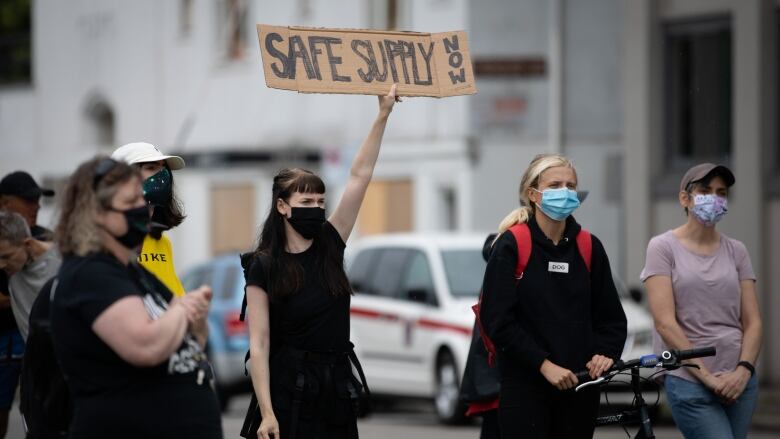Lead physician at B.C. addiction clinic says more treatment beds and a safer drug supply needed to save lives
Dr. Mark McLean says patients can wait up to 8 weeks for residential treatment

Over 4,000 patientshave accessed treatment for opioid addiction at theRapid Access Addiction Clinic in Vancouver but the clinic's lead physician,Dr. Mark McLean, says more needs to be done.
The clinic, which is located adjacent to the emergency department at St. Paul's Hospital in the city's West End, opened in 2016 after the province declared the overdose crisis a public health emergency. It accepts patients, with or without a referral, whomeet with clinic staff to create an addiction treatment plan best suited to their needs.
The problem, says McLean, is there are still too many patients, too many tainted drugs on the streetand not enough treatment beds.
"It's a numbers game," said McLean Monday on The Early Edition. "If we can get more people into treatment than numbers of deaths should go down."
And the number of deaths have recently gone up.
The B.C. Coroners Service saw 177fatalities in June, which surpassed the previous high of 174deaths in May. In July, 175 people died of an illicit drug overdose.
A statementsaid the service has detected "a sustained increase" of illicit drug toxicity deaths since the first peak of the pandemic in March,and it's now confirming five straight months with more than 100 such deaths.

McLean says the stress of COVID-19,the increased likelihood people are using alone because of physical distancing measures and less predictability in the illicitdrug supply because of supply disruptions during the pandemic are some of the reasons deaths are rising.
Officials have said border closures during the pandemic have disrupted the usual flow of fentanyl into B.C., leading the supply to bereplaced byunstable andunpredictable substances produced locally by those who might be inexperienced
That problem, said McLean, could be helped with a regulated drug supply where users know the concentration of the drugs they are using, similar to how the percentage of alcohol in a beverage is visible to the drinker.
"When we do that, it's likely therewould be substantially less overdose deaths," said McLean.
He said more residential treatment beds arealso a key component needed to address the current crisis and that often patients have to wait six to eight weeks to access a facility.
In the meantime, McLean says, medicationssuch as methadone, Suboxone andhydromorphone can help. So can having someone on your side if you are struggling with substance use issues.
"People,I think, benefit just from the contact with our staff," said McLean.
Overdose Awareness Day
Monday isInternational Overdose Awareness Day.It's a global event to acknowledge those who have died as a result of drug overdosesand to reduce the stigma of drug-related deaths.
To mark the occasion, Moms Stop The Harm, a network of Canadian families impacted by substance use-related harms and deaths, hung hundreds of pairs of shoes on the Burrard Street Bridge in Vancouver to represent the people who died of an illicit drug overdose in May, June and July.
Walk, cycle or drive on Burrard Bridge today to see/feel a fraction of the grief and loss from drug overdoses & poisonings. @momsstoptheharm #EndOverdose @OverdoseDay https://t.co/iiml6tCtnb pic.twitter.com/ooPbnmtL0H
—@mmecarrOn Aug. 25, B.C. Chief CoronerLisa Lapointe, called for the erasure ofthe stigma surrounding substance use.
"Given the toxicity of the drug supply, now is the time for all of us to demonstrate compassion and empathy," said Lapointe.
Last month, B.C. Premier John Horgancalled for a national plan to help stem theoverdosecrisis.
Judy Darcy, B.C.'s minister of mental health and addictions, said the province has escalated itsresponse to the overdose crisis in an effort "to counter the effects of the pandemic."
"British Columbians showed the world what we could do when it came to COVID-19 ... We must do the same for the overdose public health emergency in this province and we must do it now," she said in a statement.
About 5,000 people in B.C.have died of illicit-drug overdoses since the public health emergency was declared, more deaths than homicides, motor vehicle incidents, suicides and COVID-19 combined.
With files from The Early Edition












_(720p).jpg)


 OFFICIAL HD MUSIC VIDEO.jpg)
.jpg)



























































































